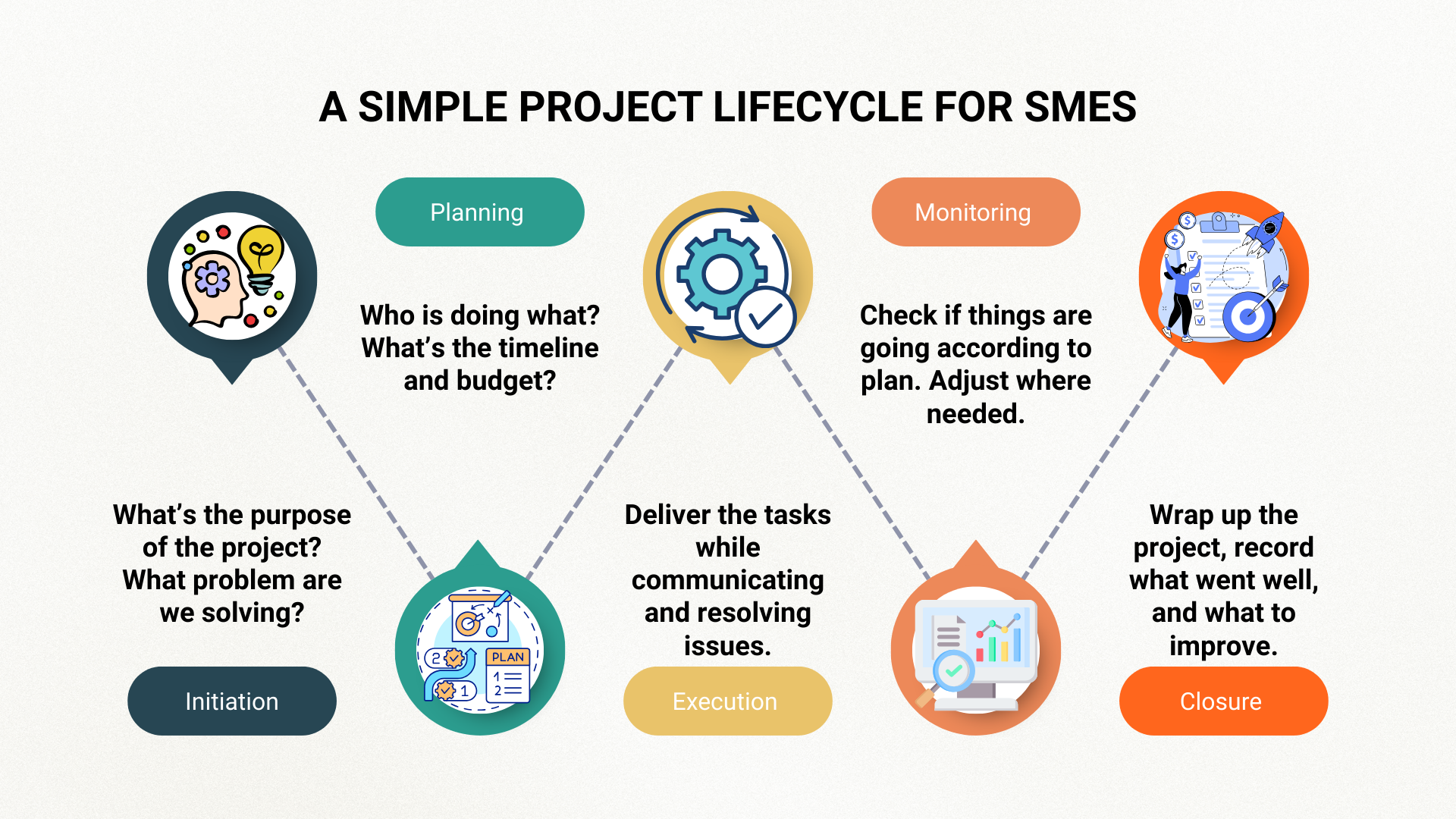Why Project Management Matters for SMEs:
Doing More with Less

Why Project Management Matters for SMEs: Doing More with Less
When you hear “project management,” you might think of large corporations managing billion-dollar infrastructure or tech launches. But in reality, project management is just as important for small and medium enterprises (SMEs) - often even more so.
Unlike big companies with dedicated project teams, SMEs typically operate with lean manpower, limited budgets, and high customer expectations. In this environment, having a structured approach to managing tasks, people, and time isn’t a luxury - it’s a necessity.
The SME Reality: Complex Work, Small Teams
Many SMEs juggle multiple internal and client-facing tasks at once - launching new products, managing customer orders, handling social media campaigns, fulfilling seasonal promotions, and more.
Common symptoms of poor project control in SMEs include:
- Team members unsure of their roles or deadlines
- Projects running late or over budget
- Scope creep and unapproved changes
- Staff burnout due to poor task distribution
- Repeated miscommunication between departments
- Lack of follow-through after project delivery
How Project Management Skills Improve SME Performance
Even basic project management principles - such as planning, scheduling, tracking progress, assigning clear roles, and reviewing performance - can transform the way SMEs operate.
| Project Management Skill | How It Helps SMEs |
|---|---|
| Planning & Scheduling | Set realistic timelines and avoid last-minute rushes |
| Communication & Coordination | Ensure everyone knows what to do and when |
| Scope Management | Control what gets done - and avoid over-promising to clients |
| Risk Identification & Response | Spot delays or problems early before they affect delivery |
| Monitoring & Feedback | Track whether the team is on track and make improvements quickly |
A Simple Project Lifecycle for SMEs
Here’s what a basic project management process might look like for an SME:
- Initiation – What’s the purpose of the project? What problem are we solving?
- Planning – Who is doing what? What’s the timeline and budget?
- Execution – Deliver the tasks while communicating and resolving issues.
- Monitoring – Check if things are going according to plan. Adjust where needed.
- Closure – Wrap up the project, record what went well, and what to improve.
Practical Tools SMEs Can Use
You don’t need enterprise software. Here are affordable tools SMEs can use to implement simple project management:
- Trello / Asana: For visual task and team tracking
- Google Sheets: For project timelines and budget monitoring
- Slack / Microsoft Teams: For internal communications
- Free Templates: Gantt charts, checklists, risk logs
How Learners Hub Supports SMEs
At Learners Hub, we understand that SMEs need practical, affordable, and accessible training. Our courses are designed to deliver:
- Real-world scenarios relevant to SME operations
- Hands-on project planning exercises
- Templates and tools SMEs can use immediately
- Customisable in-house workshops for teams
- WSQ-accredited programmes, SkillsFuture and SSG claimable
How SMEs Benefit from Project Management
| Case in Point: Smoother Promotions in a Retail Store | Case in Point: Better Coordination in a Small F&B Business |
|---|---|
|
A small clothing store wanted to run a weekend sale to clear old stock. But in previous promotions, they faced problems - price tags weren’t ready, staff didn’t know the discounts, and marketing posts went out too late.
The result? |
A small café was struggling to launch a new weekend brunch menu. Staff were unclear on prep times, ingredients ran out unexpectedly, and customers waited too long for food. Weekend service was chaotic.
As a result, the team became more coordinated. Food was served faster, customer reviews improved, and the brunch menu became a popular weekly feature - all without hiring more staff. |
Who Should Learn Project Management in an SME?
You don’t need the title “Project Manager” to benefit from these skills. Project management applies to:
- SME owners and general managers
- Operations and admin leads
- HR, marketing, or sales managers
- Anyone responsible for planning, executing, or tracking projects
- Staff managing vendors, events, or cross-department work
Final Thoughts: Structure Builds Success
SMEs move fast - but without structure, that speed leads to misalignment and burnout. Project management gives teams clarity, consistency, and control. It's not about theory - it's about doing work better, together.
With just a few tools and techniques, any SME can deliver more with less.
Ready to Empower Your Team?
Explore Learners Hub's project management courses:
- WSQ Fundamentals of Project Management for Effective and Successful Implementation
- WSQ Manage Projects to Achieve Business Goals and Stakeholder Satisfaction
- WSQ Project Management Professional (PMP)
- WSQ Manage Workplace Safety and Health in Construction Sites
For SME in-house training or team workshops, email us at: training@learnershub.com


